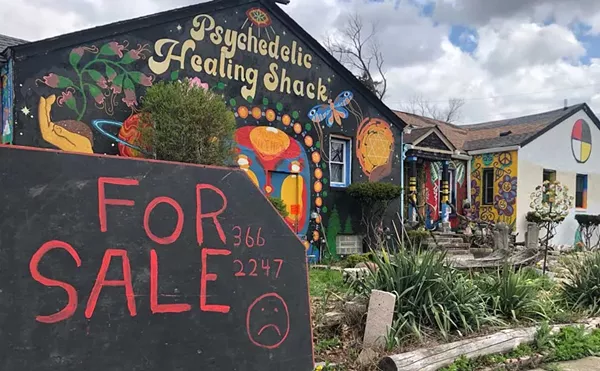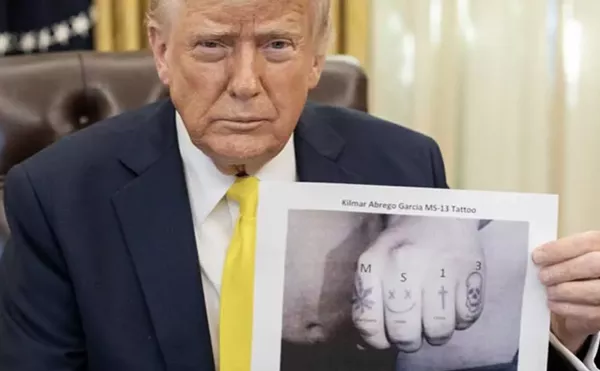
Audio By Carbonatix
[
{
"name": "GPT - Leaderboard - Inline - Content",
"component": "35519556",
"insertPoint": "5th",
"startingPoint": "3",
"requiredCountToDisplay": "3",
"maxInsertions": 100,
"adList": [
{
"adPreset": "LeaderboardInline"
}
]
}
]
He didn't do it on Twitter or Facebook — that would have been too easy.
He didn't do it off the cuff somewhere and go hide. He stood there in front of the cameras, made his statement, and took questions from the media, flanked by enough impressive local African-Americans — a state senator no less — to seriously endorse his sincerity.
Former University of Oklahoma student and frat member Levi Pettit apologized for taking part in a racist chant along with his then-Sigma Alpha Epsilon brothers on a bus.
A video of the SAE guys singing their little (I mean that literally) hearts out on the bus as they traveled along showed up on Twitter, setting off a series of surprising actions. The institutional responses were swift and decisive. Oklahoma President David Boren expelled two students and severed ties with the fraternity chapter. The SAE national organization condemned the song (apparently taught at an SAE national leadership event), closed the chapter and suspended its members, and announced plans to put its 15,000 student members through diversity training.
They didn't play around with some "let's look into this and buy some time until this dies down" strategy that you see so often. In those circumstances usually nothing happens. So, at least on this incident, the institutions stepped up to the plate.
Still, the most heartening response was from Pettit, one of the expelled students.
"There are no excuses for my behavior. I never thought of myself as a racist. I never considered it a possibility," Pettit, flanked by clergy and black civic leaders, told reporters at an Oklahoma City church. "But the bottom line is that the words that were said in that chant were mean, hateful, and racist. ...
"The truth is that what was said in that chant is disgusting."
Apparently the African-Americans Pettit met with explained to him that the line "you can hang him from a tree" refers to the murderous practice of lynching. Maybe they showed him some pictures of dead black bodies hanging from trees and played Billie Holiday's song "Strange Fruit."
I found the apology refreshing. Pettit not only expressed his remorse, he gave some insight as to how some of these abominations start, take root, and grow. Pettit responded to a question regarding the offensive words with: "I knew they were wrong, but I never knew how or why they were wrong."
Pettit didn't have to do this (well maybe he did — his parents were reportedly furious about his involvement). However he could've easily slipped into resentment at having been expelled. He could have slipped into the ugly racist subculture that would have fed that resentment and helped turn him into some kind of icon.
Consider George Zimmerman, the man who killed Trayvon Martin and got away with it. He was in the news last week complaining that President Barack Obama turned Americans against him. Since his acquittal for murder charges, he has seemingly gone out of his way to flaunt his lack of remorse, show off associations with gun enthusiasts, been arrested for assault, and called a "psycho" by an ex-girlfriend. He's not sorry for anything.
Pettit's apology is one for the books. He expressed remorse, explained why he'd been wrong, and explained what he intended to do in the future.
Not too many great apologies get handed out in the public sphere. Nobody in Ferguson, Missouri, seems to be apologizing for the years of racist policies in the city that the Department of Justice revealed in its report on the Michael Brown killing. In fact, last week Ferguson Mayor James Knowles complained publicly that the DOJ report focused too much on race.
When you look at the numerous instances of black people killed by police, there are no apologies forthcoming. All you get is vilification. Police shot 12-year-old Tamir Rice within two seconds of arriving on the scene in Cleveland. The city claims the kid's death was his own fault. Then Cleveland Mayor Frank Jackson apologized to Rice's family for the wording on a legal document that blamed Tamir, but he didn't apologize for Tamir's killing.
Apologies come hard. Corporations don't apologize for polluting the environment and causing disease in numerous places. British Petroleum apologized for the Gulf Oil spill, but their actions since then have shown they really didn't mean it.
The United States government hasn't apologized for slavery in this country. And when Obama does apologize for something the nation has done, he catches hell from the right wing. Even the pope apologizes sometimes. In 2000 John Paul II apologized for the sins of Catholics throughout the ages for violating "the rights of ethnic groups and peoples, and [for showing] contempt for their cultures and religious traditions."
The point here is that Pettit's apology had the ring of sincerity. He talked about wanting to be able to stand up against racist behavior in the future, as he said he should have as the frat guys partied on the bus.
"From this point forward," he said, "I will be the leader that I should have been."
Maybe he will be. There is certainly more engagement with the issue on Oklahoma's campus, and some movement with the SAE nationally. There are opportunities for Pettit to do many good things.
"This is just the beginning of a great conversation in our community," said Sen. Anastasia A. Pittman, chair of the Oklahoma Black Caucus, after Pettit spoke.
I hope it is a conversation that spreads far and wide. Hey, maybe someplace like Starbucks could start a Race Together campaign at its coffee shops to spur conversation.
Nope, that'll never work.
Larry Gabriel writes the Stir It Up and Higher Ground columns for Metro Times and is editor of The American Cultivator.






